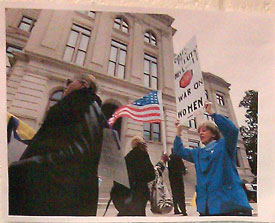
Emory University student William Matheson offers this A+ essay that clarifies the difference between rights and commodities, a lesson that Georgetown Law School student Sandra Fluke seems to have slept through.
Nonetheless, she was invited to address undergraduates at Georgetown on April 16--no press allowed. The talk was called "A Conversation with Sandra Fluke on Contraception Access."
By William Matheson, posted April 18, 2012: What is a right? To me, a right is something each person possesses upon birth. It carries no cost and is not determined by law, customs, or cultures. It is universal and cost free.
This definition of a right is based on “Natural Law, which can be traced back to the Enlightenment of the eighteenth century. The first sentence of the Declaration of Independence, our founding document, clearly demonstrates that the Founding Fathers embraced this philosophy.
“We hold these truths to be self-evident, that all men are created equal, that they are endowed by their Creator with certain unalienable rights, that among these are life, liberty, and the pursuit of happiness.”
From the passage, the message is evident. People, upon birth, regardless of race, religion, or location, possess certain rights. The government does not give these rights; therefore the government cannot revoke these rights. Look no further than the language of the United States Bill of Rights, particularly the first two amendments.
“Congress shall make no law respecting an establishment of religion, or prohibiting the free exercise thereof; or abridging the freedom of speech, or of the press; or the right of the people peaceably to assemble, and to petition the Government for a redress of grievances.”
“A well regulated Militia, being necessary to the security of a free State, the right of the people to keep and bear Arms, shall not be infringed.”
 It is clear, after examining the language, that the government does not bestow the rights to the people. Instead, it simply states that Congress cannot make laws “abridging” or “prohibiting” such things. After all, no document, even the U.S. Constitution, can bestow these rights, because all possess them at birth. Therefore, as opposed to providing the people with rights, the federal government, under the United States Constitution, acts as a protector of the rights.
It is clear, after examining the language, that the government does not bestow the rights to the people. Instead, it simply states that Congress cannot make laws “abridging” or “prohibiting” such things. After all, no document, even the U.S. Constitution, can bestow these rights, because all possess them at birth. Therefore, as opposed to providing the people with rights, the federal government, under the United States Constitution, acts as a protector of the rights.
In current political discourse, the question of rights has been resurrected. Whether it is the current administration claiming birth control and health care as rights, or Occupy Wall Street protestors claiming college education as a right, the issue has been forced back into the public forum. For the most part, liberal activists have come out claiming these as absolute and necessary rights of every person. However, the arguments, most of which are attempts at appealing to emotion, fail to address the key aspect of said “rights”. Health care, birth control, and college education are all commodities, and no person has a right to a commodity.
Rights and commodities stand in stark contrast. As defined earlier, a right is something all people possess at birth that is above law and carries no cost, while a commodity, or good, must be produced, gathered, or harvested by man. This difference is paramount. For example, my right to free speech costs you nothing, as do my rights to bear arms and religious belief.
 To the contrary, the so-called “right” to health care does come with a price. Birth control did not appear out of nowhere and spread across the market. Instead, it was created through countless hours of research, testing, and human labor. The same can be said for health care. Surgeons do not grow on trees. In order to receive birth control, health care, or college education, a price must be paid for the resources used and the services provided. If these are rights, then it logically follows that they must be provided to individuals free of charge. After all, my other rights do not come with a price tag. They are mine at birth, so how can a price be put on them? Surely imposing a burden on one to exercise his rights is a form of denying said rights.
To the contrary, the so-called “right” to health care does come with a price. Birth control did not appear out of nowhere and spread across the market. Instead, it was created through countless hours of research, testing, and human labor. The same can be said for health care. Surgeons do not grow on trees. In order to receive birth control, health care, or college education, a price must be paid for the resources used and the services provided. If these are rights, then it logically follows that they must be provided to individuals free of charge. After all, my other rights do not come with a price tag. They are mine at birth, so how can a price be put on them? Surely imposing a burden on one to exercise his rights is a form of denying said rights.
Beware those who would take from others to give to themselves. Even if sanctioned by the government, the action still constitutes theft, a violation of people’s rights. To claim a commodity as a right is to claim another man’s labor as one’s own. If you believe you have a right to someone else’s property, then you do not believe in the other’s property rights. Claiming what is mine as something that should be yours is to say that what I have produced does not truly belong to me. If I do not have a right to the fruits of my labor, do I have property rights? Am I free? The answer to both questions is no. For this reason, no person has any right to such things as health care, birth control, education, food, shelter, and the like. All of these are commodities, and no man, regardless of race, wealth, or location, has a right to them.
 William Matheson is a college student at Emory University. He is studying business and hopes find success in both business and military service in his future.
William Matheson is a college student at Emory University. He is studying business and hopes find success in both business and military service in his future.





